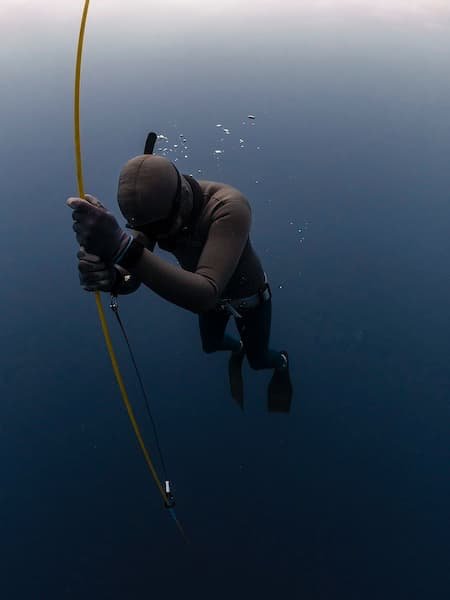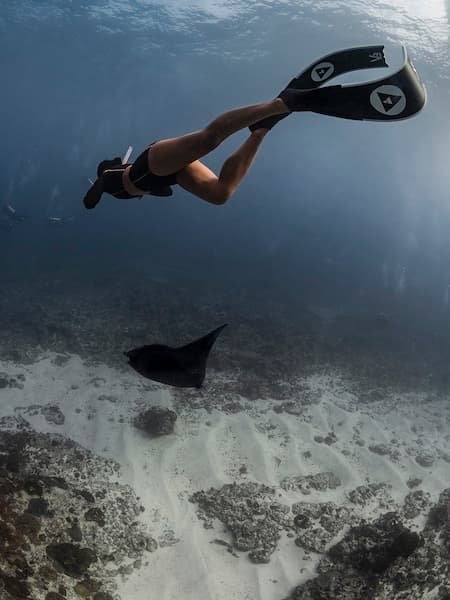
 Olivia Møller
Freediver - Activist - Explorer
Olivia Møller
Freediver - Activist - Explorer

 Olivia Møller
Freediver - Activist - Explorer
Olivia Møller
Freediver - Activist - Explorer
At sunrise, the water lies still. The sea looks endless, its surface glowing like molten silver. For many, this moment is a brief pause before the working day begins. But for those who have chosen simplicity, the morning tide is not an interlude but the main event. Time is the real currency. And minimalism, in its purest form, is the art of buying it back.
A simple life is often mistaken for deprivation. Fewer things, fewer luxuries, fewer pursuits of status. But what if simplicity is not subtraction but redirection? What if by living with less we make space for more of what truly matters? For freedivers, that “more” is not in storage units or shopping bags but in the water column, in the descent along a line, in the feeling of lungs emptied and a body suspended.
This essay explores the economics of minimalism. It asks how stripping life to essentials opens room for deeper living. It shows how a redefined relationship with consumption, work, and time can fund not just more freedom but more days in the sea.
Minimalism is often portrayed as a design trend: clean surfaces, neutral colors, curated objects. But beneath the aesthetic is an economic philosophy. To live simply is to live deliberately. When we spend less on things we do not need, we create a surplus of both money and hours. That surplus is where life begins to expand.
Financially, the arithmetic is straightforward. Each euro or dollar not spent on excess goods lowers the pressure to earn more. Lower income needs can translate into fewer working hours or more flexible employment. This cycle, repeated month after month, liberates time from the grip of the labor market. The economist Juliet Schor has described this as “downshifting,” a deliberate choice to consume less and work less, in exchange for a more balanced life.
Minimalism also brings psychological savings. Fewer possessions reduce decision fatigue and lower stress. Maintenance, storage, and replacement all shrink. A life uncluttered creates clarity. The result is not simply lower costs but higher quality. Freedivers know this intuitively, the lighter the gear, the deeper the presence.
Minimalism, then, is not about frugality for its own sake. It is about reallocating resources. What is no longer spent on redundant purchases can be directed to experiences, travel, training, time spent in coastal villages, or investing in a single piece of high-quality equipment rather than five mediocre ones. Minimalism funds not just subsistence but meaning.
The modern economy is built on a cycle of work and spend. Long hours at the office fuel salaries that, in turn, finance consumption. But the same cycle generates debt, stress, and a constant hunger for more. Downshifting interrupts this loop.
To downshift is to accept less income in exchange for more autonomy. It is the software engineer who chooses part-time work to spend afternoons in the bay. It is the teacher who declines promotion for the sake of summers in the islands. Economically, it is a trade, wages for water, salary for silence.
Studies have shown that downshifters report higher satisfaction despite lower incomes. The gains come from reclaiming time, health, and connection. The sea is a perfect recipient of that reclaimed time. Freediving is not a hobby that can be squeezed between conference calls. It demands rhythm. It requires rest, recovery, and the patience to align with tides. A simple life makes that possible.
Culturally, downshifting also resists the status symbols of consumer society. Freedivers often wear no watch, carry no air tank, bring no display of wealth. Their prestige is not in what they own but how long they can stay under. In this sense, minimalism and freediving are aligned, both measure value by presence, not possessions.

Freediving is perhaps the purest expression of minimalism in sport. Unlike scuba, it requires little gear. A mask, a snorkel, a pair of fins, and sometimes not even that. The ocean provides the rest. Where other sports thrive on accumulation, carbon bikes, new skis, racks of surfboards, freediving moves toward reduction.
At its core, freediving asks a person to rely only on what they already possess, their breath. The less you carry, the further you can go. The sport embodies the minimalist ethos, strip away the non-essential, and discover depth.
This simplicity also makes freediving accessible. While carbon fins and tailored wetsuits represent investments, the entry threshold is remarkably low compared to other ocean pursuits. A body of water and a breath of air are enough. For those living simply, this accessibility is crucial. It proves that joy does not require accumulation.
Philosophically, freediving teaches the same lesson that minimalism does, you already have enough. What you need is not more gear, more money, or more possessions, but more attention, more patience, more surrender.
There is an environmental dimension to this convergence. Minimalism reduces consumption and, by extension, waste and emissions. Freediving, too, carries a small ecological footprint. Unlike activities that rely on fuel, motors, or heavy infrastructure, freediving is light. It leaves little trace beyond a ripple at the surface.
This shared ethos matters. The ocean is under pressure from pollution, overfishing, and warming waters. To live minimally is to live in solidarity with the sea. Each choice not to buy fast fashion, not to upgrade electronics, not to fill homes with plastic, is a choice to relieve some strain on marine ecosystems.
Minimalism and freediving both encourage presence over possession. Both call us back to a slower rhythm. Both demand respect for limits, whether those limits are ecological boundaries or the body’s urge to breathe. The ethics align seamlessly, to live simply is to live in balance with the planet that sustains us.

Imagine two lives.
In the first, a person wakes early to rush through traffic, spending eight hours at a desk, eyes fixed on spreadsheets and inboxes. The paycheck funds an apartment filled with furniture, subscriptions, and gadgets. Weekends are for errands. Vacations are rare, hurried, expensive.
In the second, the same person decides to live differently. They sell what they do not need, reduce expenses, and move closer to the coast. Work becomes part-time. Instead of filling closets, they save for a single trip each year to a diving location they have always dreamed of. Afternoons are spent in the water, not in meetings. Their status is no longer measured by promotions but by the calm in their breath holds.
The shift is not easy. Minimalism demands sacrifice. It means resisting social expectations, saying no to consumer rituals, and living with less comfort at times. But the rewards are profound. The most valuable asset becomes not a car or a watch, but the ability to spend long stretches under the surface, weightless and unbothered.
Freedivers often say that diving is like returning home. Minimalism, too, feels like a return, to clarity, to balance, to an older truth about what life is for.
In the end, the economics of a simple life are not only financial. They are existential. Money saved buys time. Time spent consciously creates meaning. Meaning, for the freediver, is found in the quiet below the waves.
Minimalism is not about asceticism. It is about prioritization. It is about choosing water over wardrobes, horizons over hardware, experience over excess. In its best form, it is not an absence but a redirection toward the essence of living.
The sea does not ask us to bring more. It asks us to bring less. Fewer possessions, fewer distractions, fewer layers between our skin and the salt. The reward is immeasurable, minutes that feel like eternity, silence that feels like music, a life that feels full because it has been pared down to what matters.
To live simply is to live deeply. And in that depth, both literal and metaphorical, we find the truest wealth of all.
References
Schor, Juliet B. The Overspent American: Why We Want What We Don’t Need. Harper Perennial, 1999
Elgin, Duane. Voluntary Simplicity: Toward a Way of Life That Is Outwardly Simple, Inwardly Rich. Harper, 2010
Alexander, Samuel. “The Sufficiency Economy: Resilience and Sustainable Consumption.” Environmental Politics, 2015
Wikipedia contributors. “Simple Living.” Wikipedia
Wikipedia contributors. “Downshifting (lifestyle).” Wikipedia
Wikipedia contributors. “Freediving.” Wikipedia
The Minimalists. “Benefits of Minimalism.”
Joshua Becker. “The Economics of Minimalism.” Becoming Minimalist
Aeon. “Why the Simple Life Is Not Just Beautiful, It’s Necessary.”